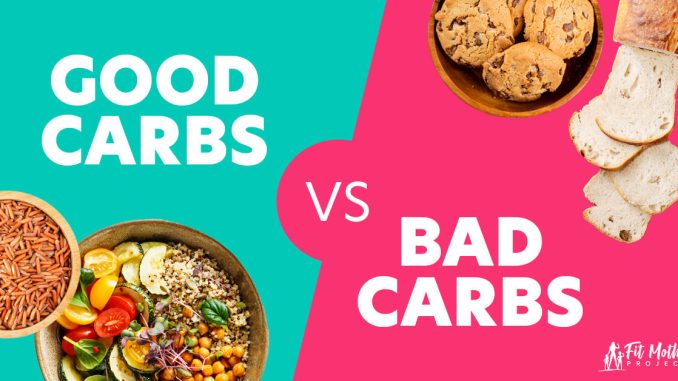
Carbohydrates have long been a topic of debate in the world of health and nutrition. For years, they’ve been both praised as a vital energy source and vilified as the main culprit behind weight gain. This conflicting narrative has left many people wondering: are carbs good or bad? The truth is, like most things in nutrition, it’s not black and white. Understanding the role of carbohydrates and how to include them wisely in your diet is the key to making informed, healthy choices.
What Are Carbohydrates?
Carbohydrates are one of the three macronutrients, along with proteins and fats, that our bodies need to function properly. They are the body’s primary source of energy, breaking down into glucose (sugar) that fuels everything from brain function to physical activity.
There are two main types of carbohydrates:
-
Simple Carbohydrates: These are sugars that are quickly digested and absorbed by the body. They can be naturally occurring (in fruits and milk) or refined (found in candy, soda, and pastries).
-
Complex Carbohydrates: These include starches and fiber, found in whole grains, legumes, vegetables, and some fruits. They take longer to digest, providing more stable energy and greater satiety.
The Demonization of Carbs
In recent years, many popular diets such as keto, Atkins, and low-carb high-fat (LCHF) plans have contributed to the negative perception of carbohydrates. These approaches often suggest that cutting carbs leads to rapid weight loss, increased energy, and better health outcomes.
While these diets can offer short-term results for some people, they’re not a one-size-fits-all solution. The idea that all carbs are “bad” oversimplifies the complex role they play in our overall health.
The Benefits of Healthy Carbs
Not all carbohydrates are created equal. Whole, unprocessed carbs provide a wide range of health benefits:
1. Energy Production
Carbs are the most efficient fuel source for your body and brain. During exercise or mentally demanding tasks, your body relies on glucose for peak performance.
2. Digestive Health
Complex carbs that are high in fiber—like oats, beans, and whole grains—support digestive regularity, prevent constipation, and help regulate blood sugar levels.
3. Heart Health
Whole grains and legumes can help lower cholesterol and reduce the risk of cardiovascular disease. Fiber-rich diets are also linked to lower blood pressure and healthier weight.
4. Nutrient Delivery
Fruits, vegetables, and whole grains don’t just provide carbs—they also come packed with essential vitamins, minerals, antioxidants, and phytonutrients.
When Carbs Become a Problem
Carbs become problematic when they’re overly refined and consumed in large quantities. These include:
-
White bread, pasta, and rice
-
Sugary drinks and snacks
-
Packaged baked goods
-
Breakfast cereals high in sugar
These foods can lead to blood sugar spikes and crashes, increased hunger, and higher calorie intake overall. When consumed frequently, they can contribute to weight gain, insulin resistance, and chronic diseases like type 2 diabetes.
Finding the Right Balance
Instead of fearing carbs, the goal should be to choose the right types and practice moderation. Here’s how:
1. Choose Whole Over Refined
Swap white bread for whole-grain, sugary cereals for oats, and processed snacks for fresh fruit or nuts.
2. Watch Portion Sizes
Carbs should be part of a balanced plate. Fill half your plate with vegetables, a quarter with lean protein, and the remaining quarter with whole grains or starchy vegetables.
3. Pair Carbs with Protein or Fat
Combining carbs with protein or healthy fat slows digestion, stabilizes blood sugar, and helps you feel full longer.
4. Don’t Skip Carbs Entirely
Going too low on carbs can lead to fatigue, brain fog, and nutrient deficiencies. Include a variety of carbs to meet your energy and nutrient needs.
Who Should Limit Carbs?
While most people benefit from including healthy carbs, there are exceptions. Individuals with insulin resistance, diabetes, or certain metabolic conditions may need to moderate their carbohydrate intake and focus on low-glycemic options. However, even in these cases, completely eliminating carbs is rarely necessary or recommended without medical supervision.
The Bottom Line
Carbohydrates are not the enemy. In fact, they are a crucial part of a balanced and healthy diet. The key lies in choosing nutrient-dense, fiber-rich sources and avoiding overly processed, sugar-laden varieties. By understanding the different types of carbs and how they impact your body, you can enjoy the benefits of this essential nutrient without the confusion or guilt.
Instead of asking, “Are carbs good or bad?” ask, “Which carbs are best for my body and lifestyle?” With mindful choices and balance, carbs can absolutely be part of a healthy, fulfilling way of eating.
Leave a Reply